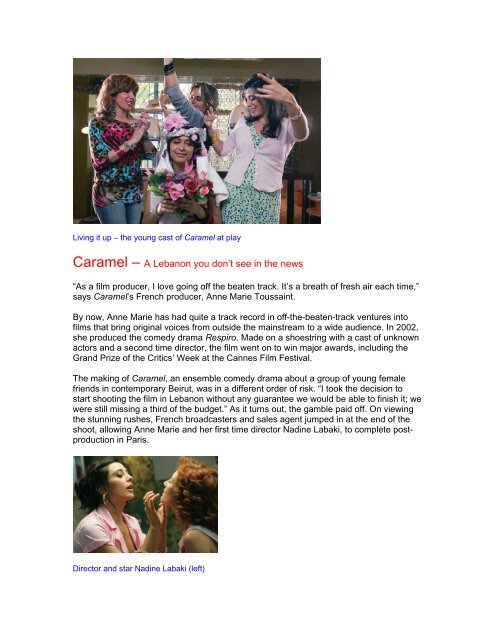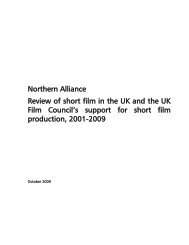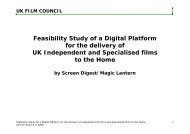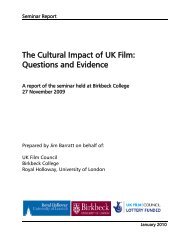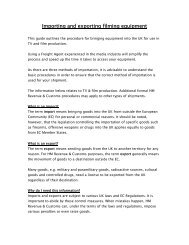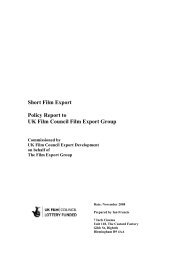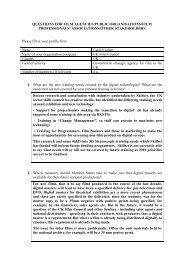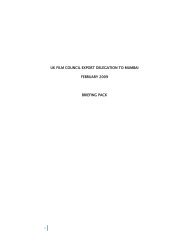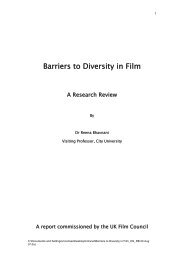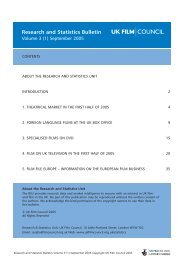Create successful ePaper yourself
Turn your PDF publications into a flip-book with our unique Google optimized e-Paper software.
Living it up – the young cast of <strong>Caramel</strong> at play<br />
<strong>Caramel</strong> – A Lebanon you don’t see in the news<br />
“As a film producer, I love going off the beaten track. It’s a breath of fresh air each time,”<br />
says <strong>Caramel</strong>’s French producer, Anne Marie Toussaint.<br />
By now, Anne Marie has had quite a track record in off-the-beaten-track ventures into<br />
films that bring original voices from outside the mainstream to a wide audience. In 2002,<br />
she produced the comedy drama Respiro. Made on a shoestring with a cast of unknown<br />
actors and a second time director, the film went on to win major awards, including the<br />
Grand Prize of the Critics’ Week at the Cannes Film Festival.<br />
The making of <strong>Caramel</strong>, an ensemble comedy drama about a group of young female<br />
friends in contemporary Beirut, was in a different order of risk. “I took the decision to<br />
start shooting the film in Lebanon without any guarantee we would be able to finish it; we<br />
were still missing a third of the budget.” As it turns out, the gamble paid off. On viewing<br />
the stunning rushes, French broadcasters and sales agent jumped in at the end of the<br />
shoot, allowing Anne Marie and her first time director Nadine Labaki, to complete postproduction<br />
in Paris.<br />
Director and star Nadine Labaki (left)
Lebanese-born Nadine had never directed a feature before, let alone scripted one. “I<br />
was over in Beirut in 2003 and was struck by the quality of her work as a music video<br />
director. It was vibrant, visually sharp and she seemed to have a particular eye for<br />
getting the best performances out of women,” says Anne Marie. “She felt hidebound in<br />
Lebanon and wanted to expand her talent so I encouraged her to write a screenplay.”<br />
Under Anne Marie’s coaching, Nadine applied to the Résidence du Festival de Cannes.<br />
The Résidence is an actual place – a villa in the centre of Paris - as well as an<br />
immersive six months’ experience for fledgling script writers and cinéastes needing time<br />
off from real life to write. Nadine was selected amongst hundreds of applicants from<br />
throughout the world to be one of the Résidence’s six room mates.<br />
In March 2005, Nadine dropped off the completed first draft of <strong>Caramel</strong> at Anne Marie’s<br />
Les Films des Tournelles in central Paris. “I liked it immediately. It was vivid, funny<br />
poignant and it was about people you hardly ever see on our screens, young Arab<br />
women struggling to make sense of opportunities and conflicts in a culture in transition.”<br />
From that point on, the two women went through what Anne Marie describes evocatively<br />
as a gruelling “assault course” to get the film financed. This was a low-budget film by<br />
European standards but a tall order for the Lebanese, whose film industry is still at a<br />
formative stage. Yet remarkably, the film was able to start production largely thanks to<br />
early financial commitments by Arab film financiers.<br />
In Beirut, film distributor Sabban Media put up a small advance against cinema and<br />
video rights across the Arab world. ART, a market leader amongst the Arab world’s<br />
numerous pay television platforms, bought broadcast rights for its pan-Arab footprint.<br />
Also supporting the project were two public funds based in France and dedicated to films<br />
from the developing world, the Fond Sud and the Agence de la Francophonie. Fond<br />
Sud, co-managed by the Centre National de la Cinématographie (CNC) and the French<br />
Foreign Ministry, has been operating since 1984. It puts small amounts into films but<br />
with the majority of the projects coming in under €1.5 million, the money goes a long<br />
way. “Between Fond Sud and the Francophonie agency, we were pledged over 10% of<br />
our budget at an early stage, which was very helpful in getting us going.” When Anne<br />
Marie and Nadine returned to Paris from Beirut after finishing production, senior<br />
international sales company Roissy Films helped reduce the budget gap by agreeing to<br />
handle world sales against an advance. Bac Films, an experienced distributor added an<br />
advance on cinema and DVD in France. The budget was fully covered after the Franco-<br />
German public broadcaster, a channel dedicated chiefly to arts and culture, put<br />
completion money against the right to broadcast the film on their service.<br />
“Production is never where the real challenge lies,” Anne Marie reflects. “The real test is<br />
in distribution and access to the market. A film like <strong>Caramel</strong> needs a leg up, something<br />
that will help it stand out in the crowd.” In that respect, the film got exactly what it<br />
deserved: selected for the Cannes Film Festival’s prestigious Quinzaine des<br />
Réalisateurs, it was received to critical acclaim in Cannes and a tsunami of press<br />
attention. Politics were a factor too; <strong>Caramel</strong> finished shooting in Beirut on 3 July 2006.<br />
On 12 July, the Israeli army launched its bombing campaign and Lebanon crashed back<br />
into the grimly repetitive nightmare of war.<br />
“<strong>Caramel</strong> did well in Lebanon,” says Anne Marie. “The impact was much greater than the<br />
130,000 admissions, itself a very good result for a country with so few cinemas. It was
about affirming who they were to the rest of the world; complex, multi-dimensional<br />
human beings, not hapless victims or cartoon comic villains. Cinema can do this<br />
sometimes. It can open us up to others by looking for what we all have in common.<br />
These are the films I want to make.”<br />
Bridging the North/South divide – France’s Fond Sud supports filmmakers in the developing world


